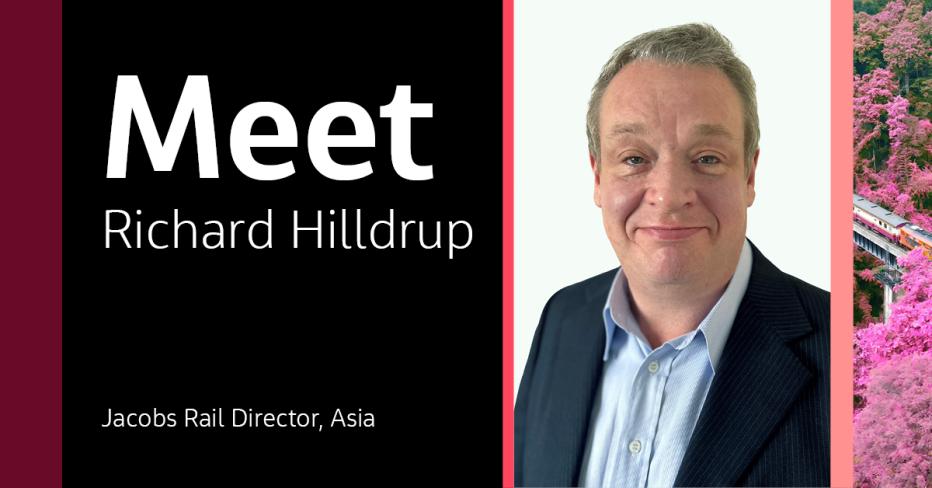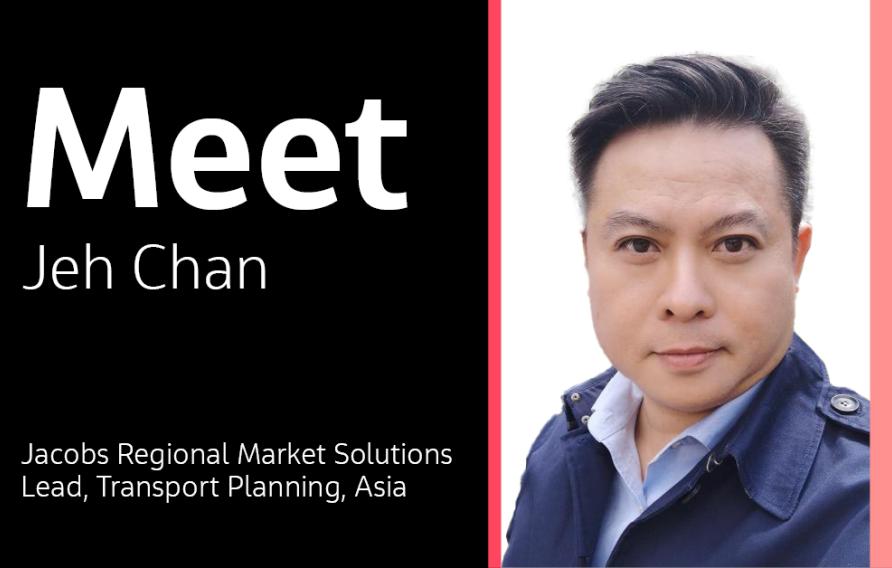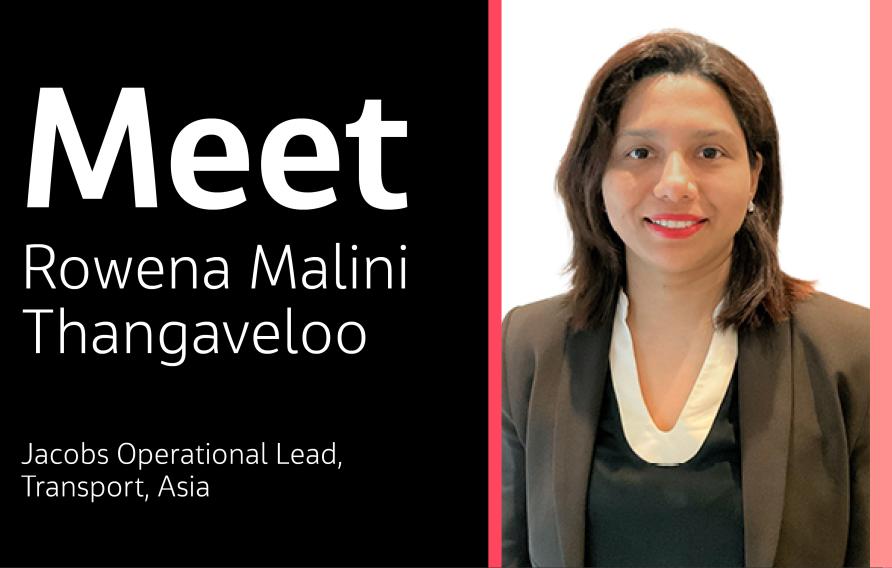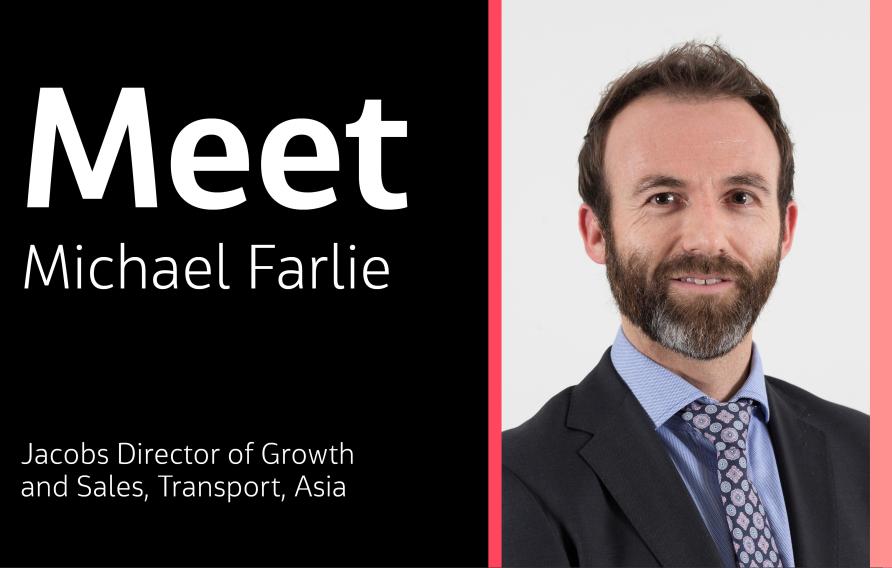
Hi Richard.Can you tell us how the work you do is helping deliver Jacobs’ strategy?
The rail industry generates and utilizes vast amounts of data, whether it be in project delivery or asset management. As one of Jacobs’ growth accelerators, data solutions is also a unique differentiator for our team as we continuously integrate our expertise in these domains to create solutions that best meet our clients’ requirements. Our rail and digital delivery teams work hand in hand with our clients, utilizing the latest tools for design management, asset condition monitoring and simulation modeling to inform decision-making and drive optimum design and business outcomes.
Tell us about your journey with Jacobs.
I joined Jacobs in Malaysia back in 2014 to lead the rail market sector. Over the last nine years, I’ve had the pleasure of witnessing the team grow in scale and expertise. Today, we take great pride in working on some of the most complex rail projects across Asia and beyond – and are also investing in the development of a new generation of talent and graduates to take on new challenges to come.
What projects are you working on right now?
We have a diverse portfolio of projects spanning geographies and technologies. For example, we’re proud to be the Systems Consultant for the new Rapid Transit System Link between Johor Bahru and Singapore, delivering all aspects of rail systems on the new link. Additionally, we’re the Program Management Consultant for the Kuala Lumpur International Airport, where we’re overseeing the delivery of the new Automated People Mover system that shuttles passengers between the main and satellite terminals. We have also delivered track work design for two urban metros and a commuter rail system in Greater Kuala Lumpur, where we’re leading both track and systems for the main contractor.
Further afield, we’re engaged in developing a reference design for funicular railways to transport both people and freight to NEOM from the Mirage Visitor Centre in Saudi Arabia – among others, just to highlight just a few!
What do you think are some of the biggest challenges facing the rail industry today?
The industry has undergone a remarkable transformation. Modern Mass Rapid Transit (MRT) and Light Rail Transit (LRT) systems are highly complex integrated systems, while mainline passenger and freight railways now cover large geographic areas requiring distributed operation and maintenance. Adding to this are the customers’ evolving needs and expectations for modern amenities such as phone and internet access, making it essential to provide reliable connectivity throughout their network. Today’s railways are having to rethink maintenance strategies while improving capacity and adopting new technologies, all while working within capital expenditure (CAPEX) and operating expenditure (OPEX) budgets.
What role do you see rail transportation play in climate response and reducing carbon emissions?
Compared to other forms of transportation, such as road vehicles and airplanes, rail transportation has always been one of the cleanest forms of transport for moving people and goods. According to the International Energy Agency (IEA), rail transportation accounts for 1% of global transport-related greenhouse gas (GHG) emissions, compared to road transport's 74.5% and air transport's 11.6%. That said, we’re seeing more and more traction in the concept of net zero rail, which aims to further reduce the carbon footprint of rail transportation. This is a significant step forward as more rail operators consider a combination of strategies, such as transitioning to renewables to power trains, implementing energy-efficient technologies and adopting sustainable and eco-friendly materials and construction approaches in the development of rail infrastructure.
In my view, the greatest opportunity still lies in creating a shift from road transport to rail – this is where rail can have the biggest impact on the environment, even potentially on the short-haul aviation industry through High-Speed Rail connecting our cities.
At the same time, rail stations can also serve as a transportation hub that provides access to active modes of transportation, such as walking or cycling, and thereby encouraging people to choose active mobility options for their daily travel needs. This can help promote healthier and sustainable communities by reducing traffic congestion, improving air quality and promoting physical activity as well as reducing carbon emissions through other forms of transport modes.
How has technology impacted the rail industry in recent years?
Technology has had a major impact both in new project delivery and rail operations. The introduction of digital engineering techniques has enabled designs to be developed faster with greater certainty and even facilitates the visualization of projects before they are built. This has provided greater certainty on project cost and timescale.
At the same time, operators have benefited from modern computer systems to automate some rail operations and provide rich datasets on the condition of the railway, allowing maintenance to be conducted more efficiently. The passenger today has far greater access to passenger information and connectivity from the train thanks to modern communication networks.
What excites you about the future of rail in Asia?
It is an exciting time for rail in Asia, with an increasing number of large-scale projects being planned and some that are well underway. With a range of new technologies coming to market, the region is well-positioned to drive the next paradigm shift in the delivery and operation of railway systems.
Can you share a challenging project you’ve been involved in?
All rail projects are challenging!
But one of the most interesting we’re currently delivering is also one of the shortest – the RTS link between Johor Bahru and Singapore. Building the railway across an international boundary presents unique challenges, such as the involvement of multiple stakeholders and authorities, as well as operational considerations that are not present in many other projects.
If you could take a scenic rail journey anywhere in the world, where would you go?
I would travel on the Orient Express from Paris to Istanbul. Paris is a city I love to visit, and Istanbul is on my list to visit one day. What better way to see both than on the iconic Orient Express.
Proudest career moment?
If I had to pick one, it would be witnessing the opening of Eurotunnel between Folkstone and Calais. As a young engineer working for Eurotunnel at the time, I had an incredible opportunity to work on this monumental project and I still recall my first journey on the works train, where I took the train down to the massive cross-over caverns on the French side. It was, and in my opinion remains, one of the greatest railway projects to be conceived and built.
What do you enjoy most about being part of #OurJacobs?
What I find most compelling about working at Jacobs is the immense range of projects and opportunities for both personal and professional growth and development. What truly sets Jacobs apart is the phenomenal people who deliver these projects, as well as the diverse and unique opportunities that come with working for a global and large-scale company.
About the interviewee
Richard Hilldrup has more than 30 years of experience providing engineering and project delivery leadership for rail projects across Asia, Africa and Europe. Richard heads our rail operations and team in Asia and is focused on bringing value and innovation and delivering best-in-class technical and operational solutions for railway operators and projects across the region.
You might be interested in...
-
 News
NewsHow Transport Planning is Shaping the Future of Mobility: A Q&A with Jeh Chan
Transport planning plays a critical role in shaping the mobility landscape of our cities. With the world becoming increasingly urbanized and the demand for mobility on the rise, it is important that we adopt a strategic and evidence-based approach to transport planning. Regional Market Solutions Lead for Mobility in Asia Jeh Chan shares his insights on this, how we’re helping our clients navigate the complexities involved and his hope for a futuristic mode of transport to become the norm.
-
 News
NewsNavigating Mobility, Infrastructure Challenges for Transport in Asia: A Q&A with Wesley Wong
In this interview, we caught up with Jacobs’ Head of Sector for Transport and Infrastructure Asia Wesley Wong on the evolution of the transport sector, emerging trends and technologies that will continue to accelerate the industry's revolution and how we’re helping clients navigate mobility and infrastructure challenges in the region.
-
 News
NewsRevolutionizing Transport: A Q&A with Rowena Malini Thangaveloo
We speak to Jacobs’ Operational Lead for Transport in Asia, Rowena Malini Thangaveloo, as she reflects on her journey at #OurJacobs and sheds light on some of the cutting-edge advancements that have the potential to reshape the future of the industry.
-
 News
NewsUnlocking Value through Asset Management: Q&A with Young Ji Kim
In this interview, Head of Solutions and Advisory Asia at Jacobs Young Ji Kim emphasizes the challenges posed by aging critical infrastructure assets and the importance of adopting a holistic approach for sustainable infrastructure development in Asia.
-
 News
NewsShaping the Future of Transportation in Asia: A Q&A with Michael Farlie
Our director of growth and sales for transport, Asia, unpacks the role of resilient and inclusive transport infrastructure, including rail, in accelerating transformation in the region.














































